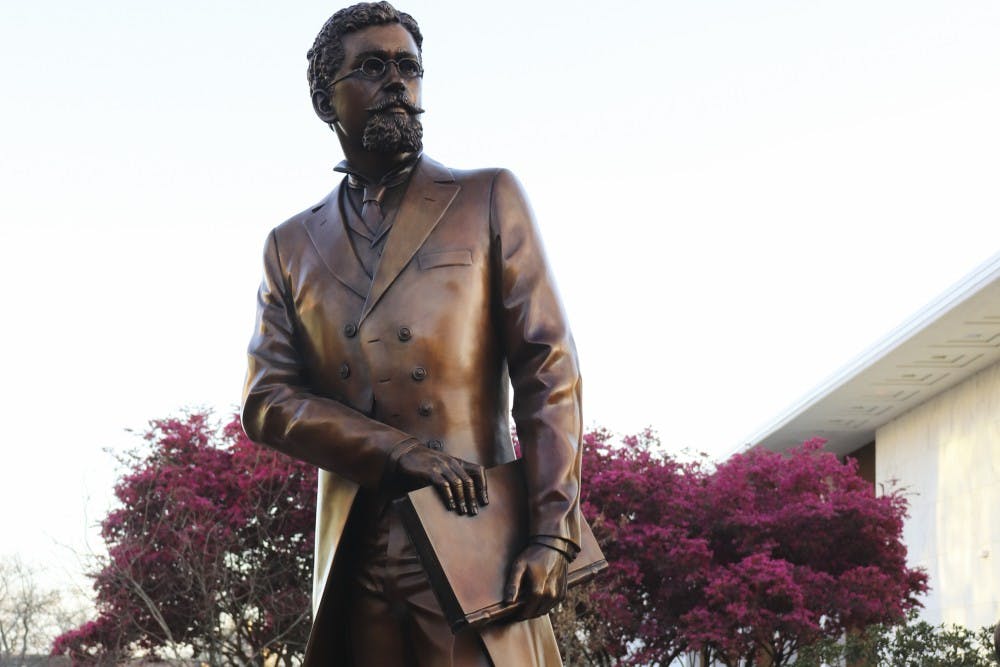In the fall of 2010, distinguished professor emerita of higher education Katherine E. Chaddock was teaching a course on the history of higher education. One of her lectures mentioned Richard T. Greener, who was the first African-American professor at USC.
From that lecture stemmed a group of students, faculty and staff who were interested in representing Greener on campus. On Wednesday, a statue commemorating his legacy was unveiled.
“The movement to do the sculpture for Greener started with a group of students, and faculty and staff,” said associate professor of art history Lydia Brandt. “It did not start with the administration. I just think that, in itself, is inspiring.”
Greener was the first African-American graduate of Harvard in 1870. USC employed him three years later as a professor of moral philosophy, Latin and Greek. While at USC, he attended the law school and obtained a law degree.
Wade Hampton, a former Confederate general, became governor and closed down the university in 1877. Greener resigned and worked as a clerk in the treasury department before teaching law at Howard University.
Greener went on to serve as secretary of the Grant Memorial and then as a diplomat for the United States in Vladivostok, Russia. He also worked in private law practice.
“For a long time, there wasn’t much legacy for Greener and there wasn’t much legacy for his community,” Brandt said. “If anything, that was denied as black students were denied entrance to the University and black faculty certainly weren’t being hired.”
An ideas competition was held in the spring of 2012 that was open to the university community and solicited ideas for what a permanent memorial for Greener could possibly look like.
After a juried competition in 2013, sculptor Jon Hair was commissioned to create the sculpture of Greener, which now stands in front of the Thomas Cooper Library.
“Here he is represented in physical form for you to remember him. I think that doesn’t go away. He’ll always be there for people to reflect on,” said associate professor of higher education Christian Anderson.
Then came the process of working with the Board of Trustees to get approval on the design, location and the accompanying plaque. The funding for the project was ultimately paid for by the university.
USC is taking a huge step in leadership in demonstrating the commitment to moving forward and being part of the next century, according to Chaddock.
“USC, the only public university in the South at that time, to have ever had a black professor is still leading the way,” she said.
People gathered in the Russell House Ballroom on Monday for a symposium to recognize Greener and his achievements just before the statue was unveiled.
Among the speakers was Congressman James Clyburn, who gave the keynote address. The first African-American to serve as the editor-in-chief of the South Carolina Law Review, Chelsea Evans, concluded that portion of the day with a quotation by Maya Angelou.
The memorial statue was unveiled on the sidewalk just east of the Thomas Cooper Library. Associate professor of political science and African American studies Todd Shaw gave his remarks as the statue was revealed.
“It is very meaningful to have a statue like that on campus and have such an event for it and so many people show up for it,” said third-year public health student Sophia Abdun.
Associate professor of history Bobby Donaldson stressed the importance of the history that this statue of Greener represents.
“My hope is that the Greener Statue and the attention on Greener will bring more attention to this critical window of time in the university’s history,” said Donaldson.
Many in attendance were pleased that the statue was placed in a highly trafficked area on campus where many students will find themselves at one time or another.
“For people of color on campus to see that this man did so much and that South Carolina isn’t all about ... the new plaque on the Horseshoe about slavery shows that we are progressing as a university and being more inclusive in recognizing the history that is there,” said Abdun.

